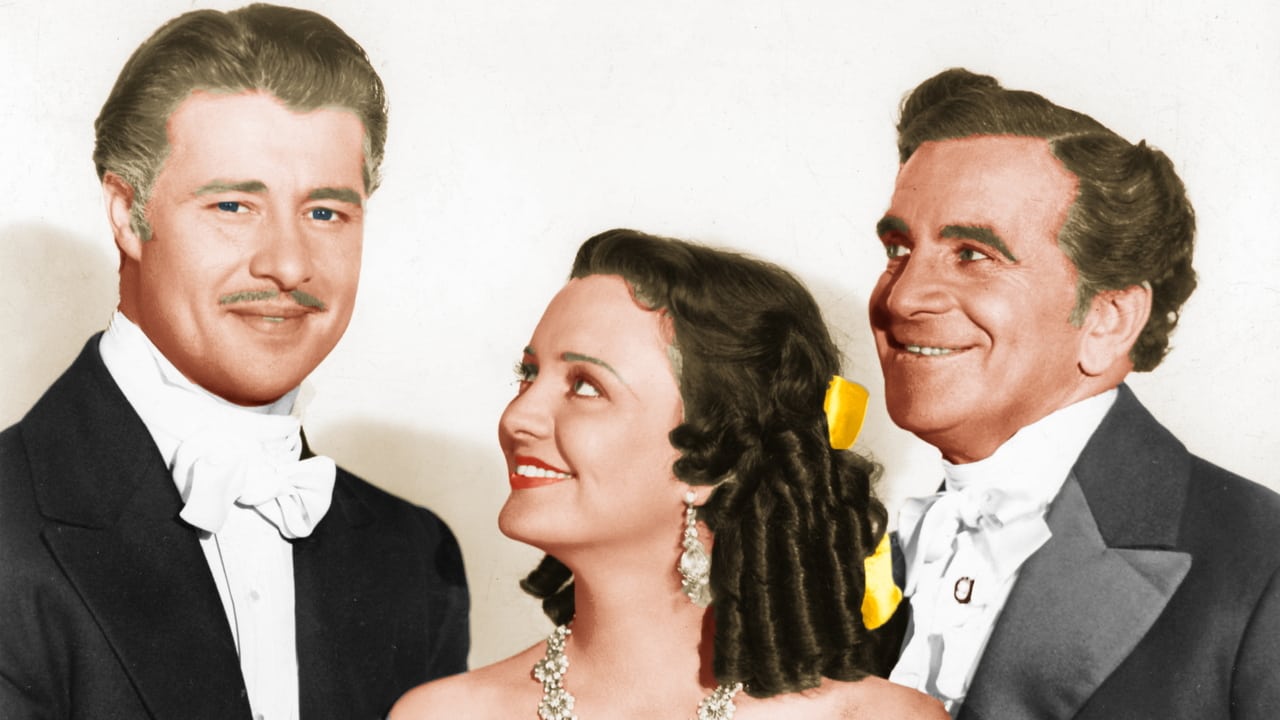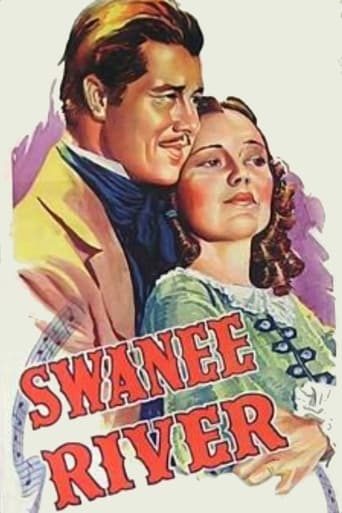

What a waste of my time!!!
... View MoreExcellent, a Must See
... View Morea film so unique, intoxicating and bizarre that it not only demands another viewing, but is also forgivable as a satirical comedy where the jokes eventually take the back seat.
... View MoreI think this is a new genre that they're all sort of working their way through it and haven't got all the kinks worked out yet but it's a genre that works for me.
... View MoreThe first time I saw this film was well over 50 years ago on WOR TV's Million Dollar Movie. It was almost a requirement in my house as my father was a big fan of Al Jolson and my mother happened to love the melodies of Stephen Foster.Two years after Swanee River was out, Foster and other songwriters of his era had a revival of sorts as the American Society of Composers and Publishers got into a wing ding battle with the radio and record industry and banned its music from broadcast and vinyl. What was done was that a lot of music that was in the public domain got revived in all kinds of strange ways. Swing versions of various classic and folk melodies invaded the airwaves. Country type music got it's own licensing agent in Broadcast Music Incorporated set up as a rival to ASCAP. It all got settled before Pearl Harbor and the country moved on to more important disputes. But Swanee River as a film gave Foster kind of a leg up on some of his other public domain contemporaries.Don Ameche, fresh from another biographical triumph in Alexander Graham Bell, makes a charming, talented, but weak of character Stephen Foster. The man who created some of the most beautiful melodies ever composed, was no businessman as other reviewers pointed out. He also suffered from alcoholism which led to his early demise. Andrea Leeds is his patient and loving wife for whom I Dream of Jeannie was composed.As was also pointed out by another reviewer, there was no such thing as ASCAP to protect the creators of melody from exploitation. What Al Jolson's E.P. Christy did to Stephen Foster insofar as his first song hit, Oh Susanna is concerned was not only true, but quite the norm. What Christy did was also decide maybe he ought to cut Foster in on the profits to keep the creative spigot flowing.Jolson as Christy was the premier minstrel artist of his day when that form of entertainment was acceptable and popular. Of course Jolson got his start in minstrel shows and damage to his reputation has come because he never would discard the black-face. This is the only time on film that Jolson plays a real life character and he sings the Foster songs with feeling and the inimitable Jolson style.By dint of the fact that his songs were minstrel show material and some and only some glorified the old South, Foster himself has come down as damaged goods in these politically correct days. That's a pity because items like Beautiful Dreamer, Old Dog Trey, My Old Kentucky Home are the stuff of genius. It's not the complete truth, but Swanee River still holds up as a nice account of America's premier melody maker of his century.
... View MoreIn this film's comment section, the one given by "theowinthrop" is particularly on the mark, and I would agree with all of its points. Being from Cincinnati, and attending four years in high school in Louisville, one of my roommates was from Bardstown, Kentucky, the locale of "My Old Kentucky Home," the state park of the same name, and "The Stephen Foster Story," one of the nation's largest outdoor (indoors if rain) dramas. This area is among America's most beautiful, and seeing it just magnifies the already giant irony of the fact that this locale, and others depicted by Foster's work, were from the pen of a man from Pittsburgh, who spent most of his time there, in Cincinnati and New York City - dying in abject poverty in the latter.Hollywood biopics about composers and musical personalities (e.g. Rodgers & Hart, Kern, Romberg, Duchin, Sousa, and a score of others) are among the most fictionalized genre in any medium. However, this one dwarfs them all. I read a brief review (I believe from Leonard Maltin) remarking that in this flick, every line of dialog seemed to spark a lyric and/or title for a new song.Jolson's inclusion is interesting to view, especially recalling that this was a time when his tremendous career had reached a point somewhat below its former level. The following years into the 1940's would see its subsequent rejuvenation, the filming of his two highly-popular biographical pictures (they may well run this one a close second for fictional aspects), and his rise to be voted top vocalist again (besting Crosby and Sinatra), only to have ill health overtake him.Seeing Ameche, who was to enjoy greater longevity than Jolson and many other contemporaries, along with Jolson, is a unique asset of this film. Enjoy this, along with the nostalgic period conveyed (and the sad history of callousness and lack of respect for those of color - both during the time of the story and filming), and the outstanding melodies which Mr. Foster created.
... View MoreI am giving this film a "6" because of my fondness for Stephen Foster's melodies (and my pity for his fate), and because - whatever one thinks of his racist "blackface" act, Al Jolson was a wonderful singer. If it had been shot as a concert film of Foster's best tunes, it would have been worth an "9" or even a "10". Instead it is tied to one of those idiotic Hollywood composer biographies. It is a sub-set to Hollywood biographies, all of which have fact problems. Here it is trying to concentrate on Foster's alcoholism (a fact), but not on the business problems he confronted in his career.Foster was the first American composer of lasting merit (although his contemporary Louis Moreau Gottschalk came close). His compositions were totally composed by him (including lyrics). But he never had any business abilities, so that while tunes like "Old Folks At Home", "Beautiful Dreamer", "The Camptown Races", "I Dream of Jeannie" and "Oh Susannah" were massive popular hits, Foster got remarkably little of the profits. Added to his problems were the lack of efficient copy-write protection in the U.S. (or on the globe, for that matter) to prevent pirating of his work. He was also the first composer who tried to live on the successful profits of his compositions. Had he been frugal, and not a drinker, it just might have worked (for a few years he did prosper), but he fumbled it. His last years were spent still composing, but living as a Bowery derelict. His end is not quite the melodrama of the film - he fell in his room cutting himself (not cutting his throat). Due to his alcoholic condition weakening his body, he died a few days later in Bellevue Hospital.Don Ameche is a terrific actor, and does what he can here - but it reminds us of an extended development of his Edward Salomon (Lillian Russell's doomed composer husband) in the Russsell biography. He is talented - greatly so - but drink and ill health doom her here. No new extension of his acting range as Foster.By 1939 I wonder if there was increasing criticism by African - American groups regarding stereotyping in Hollywood. Probably not too much yet, or at least enough for the industry to take notice. Films about D.D.Emmett (DIXIE), and other films with minstrel segments in them would still appear within the next decade. It really is not until the end of the 1940s and into the 1950s that an effect of World War II is felt - a dislike for the disparate treatment of African Americans - and begins to have an impact. So the minstrel portions, historically correct (unfortunately), were totally acceptable in this film in 1939.Oddly enough, given the accidental tragedy that ends this film, the fate of E.E.Christy is overlooked. Christy apparently had a nervous breakdown in the 1860s, and threw himself out of a window. One would not know that watching Jolson's performance, based on this script.The concluding moment of this film always stuck in my craw. Tragically announcing the death of Foster at what was supposed to be the benefit to resurrect his career, Christy/Jolson announces the first performance of Foster's latest and greatest tune. He starts singing "Old Folks At Home" (renamed "Swanee River" - as in the film title), Jolson starts singing it (remember for the first time). When the music reaches the chorus, "All the world is sad and weary..." the whole audience arose and sang it's chorus lines. Remarkable example of massive psychic transference, or poor screenplay writing: I leave it to the viewer to guess which.
... View MoreThis is hardly an accurate biography of songwriter Stephen Foster, but it's an awfully good movie thanks to its beautiful score, breathtaking photography, and scenic design. Its pictorialization of antebellum America and the South in particular rival the same year's Gone With the Wind. Producer Darryl Zanuck was especially gifted at producing these Techniciolor extravaganzas, and this one's as good as it gets. Even if one can't stand the story,--and it's a sad one--the movie is worth seeing and hearing for the remarkable skill with which it was made. Don Ameche is a pleasing Foster, and Al Jolson is on hand as Christy (of the OLD Christy Minstrels fame), and sings the songs with a gleefully vaudevillean relish which at times seems a bit over the top for the historical period. On the other hand the movie seems quite accurate in other respects and feels, to me, more like nineteenth century America than 1939.
... View More